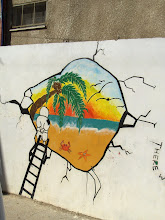
This week I did a trip that is impossible for most Palestinians on the West Bank. I traveled around Israel in areas which before 1948 were inhabited by a majority of Palestinians. My travel companions, two volunteers, two travelers and a little Hyundai Getz, improvised our way through Israel's cities, beaches and countryside.
The first decision we took was to travel south to Gaza. Going into the Gaza Strip is impossible without diplomatic visa. Our plan was therefore just to see Gaza from the outside, to experience if this would produce a special feeling. One of the world's most closed and inaccessible places is so unreal and tormented why I felt a compulsion to see it. A macabre feeling, as if I was going to a zoo to see an endangered animal in the cage... emotional porn.
We did one stop on the way there, in Sderot which is the Israeli town closest to Gaza that was most effected by Hamas bombs during the siege of Gaza. When we enter the city we witness a sleepy and run down city. Sderot is one of the cities in Israel which is suffering most from unemployment, social problems and the conflict between Israel / Palestine. The most poor Jews who make their aliyha to Israel go here, and once they find a better option they leave. Since May this year, Hamas ceased their rocket attacks and the people in the town seem to be relieved. For barely a year the city was the victim of almost daily rocket fire from Gaza. We found it difficult to get people to talk to us about it, which is understandable. After an hour in Sderot, we therefore decided to resume the journey towards Gaza.
We were south of the main check-point (Erez) so we continued south to the Karnis check-point. We followed the direction to the Gaza Strip, and found ourselves going on more and more obscure roads. After a while we were driving slowly on poor gravel roads and all signs of direction and civilization were gone. Suddenly we were just a few meters from the border to Gaza. On the other side of the fence, 500 meters away, we could see the Palestinian houses and mosques. All of us felt that something was wrong, we must have made a wrong turn somewhere. It should not be possible to be this close to Gaza. Someone in the back started to question the whole idea of going to Gaza in the first place. Almost paralized we continue forward on the gravel road that runs just meters parallel along the border. A complete silent spred in the car when we a few seconds later observed several Israeli military vehicles going towards us. Our presence was known and as sure as the Earth's gravity we got closer and closer to them, meter by meter. In the end, they surrounded us and asked us to follow them to a location farther away from the border. A few hundred meters on the dusty road and they stopped us at a patch of gravel. The somewhat surprised soldiers asked us for our passports and to explain what we were doing there. Having emerged as stupid and confused tourists for a few minutes, they found no reason to keep us. Extremely relieved, we left the closed military zone in which we had wandered into.
With Gaza and the sunset in the rearview mirror we went on to our next destination, a beautiful beach north of Ashkelon. We prepared our sleeping bags on the beach but before we fell asleep we saw flares fired in the sky above Gaza by the Israeli army. The entire Gaza Strip lit up for a few seconds and you could not stop thinking about how it must be to live there, it must be hell, but people survive. They are fighting for their freedom, fighting to break the siege. In many newsreports they describe Israel's overreacted attack on Gaza as a response to Hamas rocket fire on Israeli towns. Less reports, however, talked about Israel's continued occupation of the Gaza Strip after the withdrawal in 2005, few talked about that Israel bombed Gaza's only power plant. Few talked about that after 2005 and before Hamas' Qassam rockets Gaza had to ask Israel for permission to do everything. Israel controlls all of Gaza's borders, even the one with Egypt, they controll the airspace and Gaza coast, they continued to make military incursions into Gaza after 2005, they continue to control fiscal policy, foreign policy, monitary policy etc.. Those were the conditions under wich Hamas broke the truce, it was under these conditions that they kidnapped Gilad Shalit, it was with a starving and oppressed population that they decided to fire their rockets into Israel. There is nothing that can justify the killing of civilians in Israel but on the other hand it is not difficult to understand on which grounds Hamas took their decision. It was a sort of blood vengeance. You kill and starve our people, why can't we do the same to you ...
A little more information about Gaza:
- 70% live below the breadline
- Half a million live in refugee camps and another half a million refugees live outside camps
- 75% of the residents are refugees
- 40% are unemployed
- Gaza's power station, water supply and sewerage systems have collapsed
- Never before has the world boycotted a people under siege who have chosen their government through transparent and democratic elections (John Dugard)
- And so much more, read more by clicking the source below











